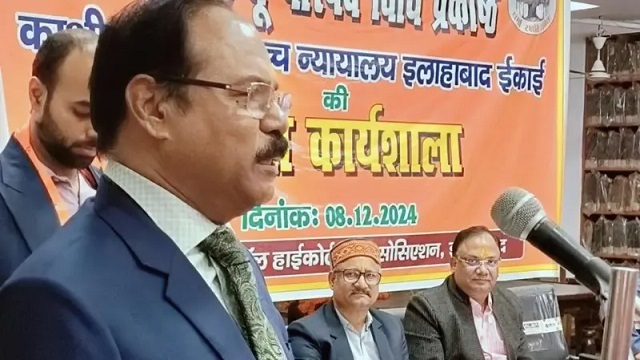Last Updated on December 9, 2024 10:39 pm by INDIAN AWAAZ
Justice Shekhar Kumar Yadav, a sitting judge of the Allahabad High Court, made controversial remarks on the Uniform Civil Code at a VHP event in Prayagraj.

WEB DESK
A sitting judge of the Allahabad High Court Justice Shekhar Yadav, on Sunday pitched for Uniform Civil Code (UCC) at an event hosted by the Vishwa Hindu Parishad in Prayagraj. Justice Yadav remarked that laws should align with the majority’s (bahusankhyak) interests, reported LiveLaw.
He argued that this principle applies not just in legal matters, but also in the context of family and society. Yadav emphasized that the legal system must serve the interests of the larger population, which he believes should be a guiding force for the country’s laws.
Without naming the Muslim community, the judge said that practices like having multiple wives, triple talaq and halala were “unacceptable”.
According to a report in India Today, Justice Shekhar Yadav in his speech argued that practices like polygamy and triple talaq should not be justified by personal laws, emphasizing that these practices go against the respect for women in Hindu scriptures.
Justice Yadav drew parallels between historical social reforms in Hinduism and certain ongoing practices within some communities. He said though reforms such as the abolition of untouchability and Sati were implemented in Hinduism, polygamy and triple talaq continue to be practised by others, adding there is a need for similar reforms.
Justice Shekhar Yadav emphasized that the push for a Uniform Civil Code (UCC) is not driven by specific religious groups or organizations but is supported by the country’s top court. He expressed his commitment to the cause, saying that the implementation of a unified legal framework would be realised, stressing that this is not merely a statement but an oath.
While expressing support for a nationwide UCC, he compared it to the lengthy process of building the Ram Temple in Ayodhya. He suggested that India would eventually adopt a unified legal system, stating that those attempting to push their own agendas would not succeed, reported India Today.
He remarked that being Hindu is not confined to specific rituals like taking a dip in the Ganga or applying chandan. He asserted that anyone who considers India their motherland and is ready to sacrifice for the country, regardless of their religious beliefs—whether following the Quran, Bible, or other faiths—is a Hindu.
He also said that, in India, people are taught from an early age not to harm even the smallest creatures. He attributed the country’s tolerance and compassion to these teachings. He contrasted this with practices in some cultures where children are exposed to animal slaughter, questioning how tolerance and compassion could be expected from those raised in such an environment.
